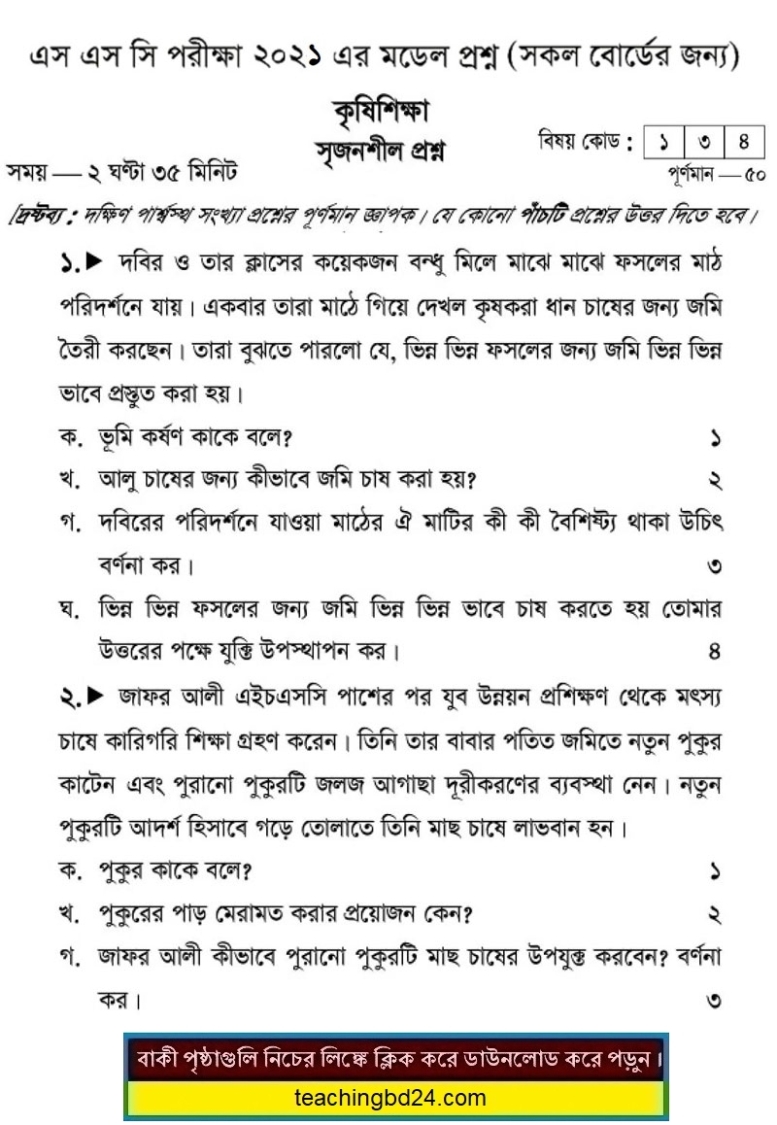SSC Agriculture Suggestion Question 2021-5
SSC Agriculture Suggestion Question 2021-5. Education is the prerequisite for the holistic development in our national life. To cope with the challenges of the fast-changing world and to lead Bangladesh to the doorstep of development and prosperity, a well-educated and skilled population is needed. In order to build up a nation imbued with the spirit of the Language Movement and our Liberation War, the secondary education aims at flourishing the talent and prospects inherent in the learners.
The aims of secondary education further emphasize developing these learners as skilled and competent citizens of the country through the process of acquiring knowledge at the backdrop of socio-economic, cultural and environmental settings. Keeping the aims and objectives of National Education Policy 2010 ahead, the curriculum at the Secondary level has been revised.
SSC Agriculture Suggestion Question 2021-5

Model Question No. 5

Efforts have also been made to apply science in all spheres of our life in order to build a nation advanced in science. Attempts are also there to make the learner capable of implementing the goals envisioned in Digital Bangladesh-2021.
Agriculture is the process of producing food, feed, fiber, and many other desired products by the cultivation of certain plants and the raising of domesticated animals (livestock).
Agriculture is the science and art of cultivating plants and livestock. Agriculture was the key development in the rise of sedentary human civilization, whereby farming of domesticated species created food surpluses that enabled people to live in cities. The history of agriculture began thousands of years ago. After gathering wild grains beginning at least 105,000 years ago, nascent farmers began to plant them around 11,500 years ago. Pigs, sheep, and cattle were domesticated over 10,000 years ago. Plants were independently cultivated in at least 11 regions of the world. Industrial agriculture based on large-scale monoculture in the twentieth century came to dominate agricultural output, though about 2 billion people still depended on subsistence agriculture into the twenty-first.
Modern agronomy, plant breeding, agrochemicals such as pesticides and fertilizers, and technological developments have sharply increased yields while causing widespread ecological and environmental damage. Selective breeding and modern practices in animal husbandry have similarly increased the output of meat, but have raised concerns about animal welfare and environmental damage. Environmental issues include contributions to global warming, depletion of aquifers, deforestation, antibiotic resistance, and growth hormones in industrial meat production. Genetically modified organisms are widely used, although some are banned in certain countries.
The major agricultural products can be broadly grouped into foods, fibers, fuels and raw materials (such as rubber). Food classes include cereals (grains), vegetables, fruits, oils, meat, milk, fungi, and eggs. Over one-third of the world’s workers are employed in agriculture, second only to the service sector, although the number of agricultural workers in developed countries has decreased significantly over the centuries.
In the United States, agriculture has been identified by the National Institute for Occupational Safety and Health as a priority industry sector in the National Occupational Research Agenda to identify and provide intervention strategies for occupational health and safety issues. In the European Union, the European Agency for Safety and Health at Work has issued guidelines on implementing health and safety directives in agriculture, livestock farming, horticulture, and forestry. The Agricultural Safety and Health Council of America (ASHCA) also holds a yearly summit to discuss safety.
teachingbd24.com is such a website where you will get all kinds of necessary information regarding educational notes, suggestions and question patterns of schools, colleges, and madrasas. Particularly, you will get here special notes of physics that will be immensely useful to both students and teachers. The builder of the website is Mr. Md. Shah Jamal Who has been serving for 32 years as an Assistant Professor of Physics at BAF Shaheen College Dhaka. He expects that this website will meet up all the needs of Bengali version learners /students. He has requested concerned students and teachers to spread this website home and abroad.

